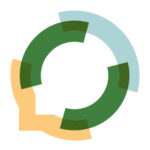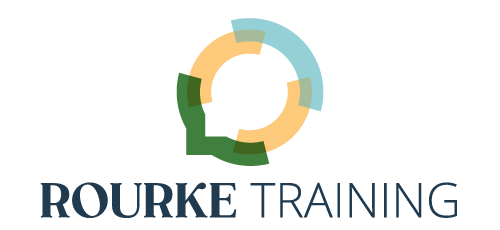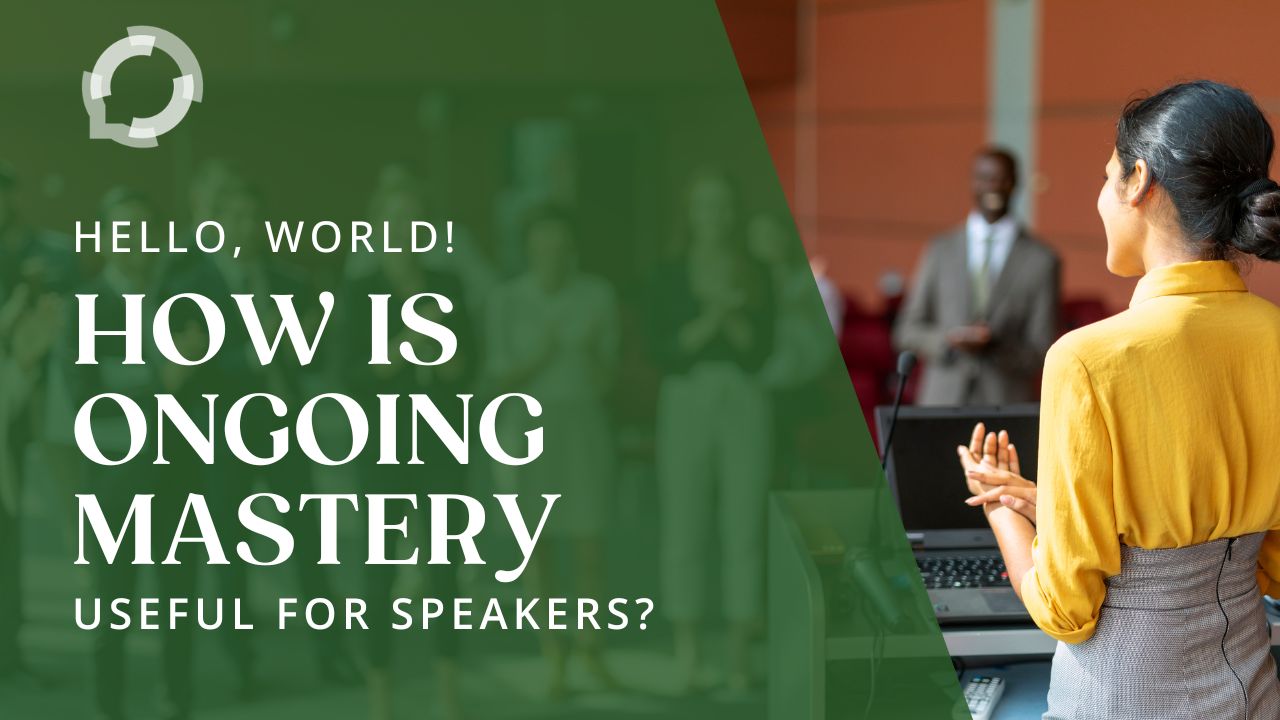Welcome to the re-launched blog for Rourke Training, where Kirsten Rourke and Kellie Donovan-Condron talk about continually improving all aspects of the craft of effectively speaking with audiences and getting your message heard. Ongoing Mastery covers a lof of territory!
We’ll bring in some of our favorite interviews and conversations from our podcast, Ongoing Mastery: Presenting & Speaking, showcase books we find useful, share tips, and occasionally rant about what’s on our mind and under our skin. Grab a cup of warm caffeine (coffee for Kirsten, tea for Kellie) and settle in.
New posts from Kirsten will go up on Mondays, and Kellie’s will be on Thursdays.
Who are we?
Kirsten Rourke is the mouth and the mindbehind Rourke Training, LLC, the founder and CEO. Kellie Donovan-Condron is the company’s writer, podcast producer, and herder of cats.
Ok, let’s be honest – there’s just one cat, Kirsten. Together with Dani, systems and tools wizard, and Jim, a graphic design deity, Rourke Training works with clients so they can speak confidently and engage their audiences.
Dani, Kellie, and Kirsten all have instructional backgrounds across very different populations. Kellie teaches college level writing and literature, and Dani taught in the K-12 system and now works in corporate education. She’s taught everything, really. Kirsten was a freelance corporate trainer who specialized in dealing with whatever was thrown at her.
The fourth member of our group, or as we say, the fourth member of our trio, is Jim the amazing. Kirsten used to tell people that she had graphic design skills, but then she met Jim at a design conference and understood the difference. Kirsten has an artistic background in drawing and painting. Graphic design is a whole other discipline, with a completely different way of thinking.
Collectively, we’re huge geeks with a deep and abiding love of pop culture, puns, and curse words. After all, this post’s title comes from the simplest message that coders learn how to do in any language. That’s not for everyone, and that’s ok. It’s who we are, and we need to let Kirsten be Kirsten (that’s from The West Wing, S1 Ep19, “Let Bartlet be Bartlet
So, what is ongoing mastery?
Kirsten coined the phrase “ongoing mastery” to describe the continual evoultion of your professional skills. Her framework is in the same vein as continuing education or professional development, with an emphasis on always working on the craft of public speaking rather than treating it as a once-a-year workshop.
The ongoing mastery framework covers content, performance, physical presence, mental preparation, research – anything and everything that touches on speaking and presenting in front of other people, from small teams to a ballroom full of industry leaders.
That’s what we’re focused on because we each have over two decades of experience, Kirsten as a technical trainer and speaker, Kellie as a college professor. Ongoing mastery informs everything we do in all areas of our professional lives.
We talk about speaker choreography and the ways in which public speaking is a performance:
- Voice work
- Body movement
- Practice with scripts vs. notes
- Storytelling
- Instructional and visual design
- Adaptability
- Connecting with your audience to build engagement during in-person and online presentations
“Performance” doesn’t mean being fake; just the opposite. It means understanding that what a speaker says starts with what the audience needs, connecting with the actual people in the room or virtual space. Your content comes second.
If you’re going to have a deck, having a well-designed deck supports your audience’s understanding, rather than competes for their attention.
But you have to be able to work without a deck, because sometimes sh*t happens. Tech fails or the power goes out partway through the training session and you can’t reschedule.
Being adaptable in the moment means being confident because you know how to pivot to a low-tech solution if necessary or even work without a deck at all.
One of our strengths as a company is that ongoing mastery applies to ourselves as much as to our clients. We lean into those moments where concepts or images mean different things to each of us. We understand that you need to target your language so that your voice is effective and your message lands with your audience.
Speaking and presenting effectively by connecting with your audience and bringing your authentic self to the stage or screen is at the heart of what we do.
The Frankfurt story
Many of the skills we’ve learned were hard won by doing things that were a little uncomfortable, a little experimental, perhaps not the sort of things you want to do, but the sort of things you want to tell about at parties afterwards, “Oh dear God. I remember when I was asked to teach backwards.”
Kirsten was working nationally as a freelance technical trainer, public speaker, instructional designer and got a chance to go overseas for a sales roll out. She got the most amazingly thorough prep she’s ever had. And it actually set the stage for the work she’s doing now.
Normally when you’re teaching something, you’re asked to teach it in a linear fashion, front to back scaffolded content. Each thing builds on the next, and that’s fine and that’s accurate, but if you’re doing it freelance, especially, you have to be able to take that stuff apart, put it into new shapes, deal with any questions or any things that are thrown at you and pivot in the moment.
Kirsten and her training colleagues were taught the material in chunks and had random questions about the material or things that were off the material tossed at them so that they had to deal with them, show how they would be responding in real time. They had to be able to adapt the content as needed because they would be on their own once overseas.
They were thrown in the deep end of the pool and told to swim; Kirsten was doggy paddling to save her life. And it was a wonderful experience. She did it twice and it was amazing.
When she went for the first time to Frankfurt, Kirsten got her first real world encounter of being on her own. Her contact person started the day with, “Um, we have a problem,” which is always what you want to hear, right?
The problem was this: the most important information for this particular German team to learn came in the later part of the day, when their system was least able to process the training activity.
Why did the time of day matter? Because the software was on a server in the U.S. In the early part of the training, the German company’s systems ran smoothly, but by the afternoon, American users were also using the software, causing the German systems to lag and be nearly unusable.
Kirsten needed to put the most important material at the start of the day, when the German systems could handle the traffic. After screaming into her hotel room pillow, as one does, she rearranged her deck and created the narrative to connect the new order, teaching the material basically backwards.
If she had not been prepped to look at the content as modular bits, if she had not been prepped to make the narrative connection points between those content pieces, she would not have been able to do this. The training would have been individual blocks that make no sense together. That would not help her audience understand the material.
The Lisbon story
Kirsten thought that was pretty much the big thing that was going to be thrown at her until she went to the next city, Lisbon. (imagine ominous music playing here)
She was supposed to teach four hours of specific material for the country manager and had been given a specific time slot. The manager came in and said, “I will give you 45 minutes.” Luckily, compressing the material was part of the prep she’d received. They had been asked to highlight the different areas that were the absolutely the most important, and those pieces had to be the ones that stayed.
So you have to be able to accordion stretch and compress your content. And Kirsten knew that already as a trainer, but doing it on the fly like that was quite a challenge.
Going from Frankfurt to Lisbon and having those experiences set the foundational knowledge for Rourke Training’s approach to coaching and ongoing mastery.
So that’s us: fun, irreverent, serious about public speaking, not so serious about ourselves.
Tell us about you
What brings you to speaking and presenting? What message are you bringing to your audience? What would you like to work on for your own ongoing mastery? What do you want to learn – or what do you have to get better at, stat?
Check Out Our YouTube Channel
The Rourke Training – Ongoing Mastery YouTube channel has a bit of something for everyone. Go there to get Kirsten’s take on examples of public speaking, as well as reflections on her entrepreneurial journey. The channel is also the home of the podcast Kirsten and Kellie produced for 5 years, Ongoing Mastery: Presenting & Speaking, which covers everything connected to continually improving your craft of being a public speaker, from interviews and mini-coaching sessions with guests to conversations between Kirsten and Kellie.
Come join us.
Cheers, Kellie


